Thomas Nagel storms out and poses questions about the meaning of life, his humility and perception enable him to ask humans why at time life feels absurd (Pritchard, 2010). He uses the phrase nothing matters to emphasize his ideology towards the absurdity of life. The issue of death enhances the psychologist's perceptions terming death as imminent, and no human being can surpass it (Bowie, 2011). In other words, Nagel (1897 p. 94) state "Perhaps you have had the thought because in two hundred years we'll all be dead." The absurdity of life shortens the future achievements of each person; therefore, it is uncertain that what humans currently do will make an impact millions of years to come (Thagard, 2010). The above facts extend the essay structure towards the analysis of Thomas Nagel's book "What does it all mean?" and it will focus on chapter ten "The meaning of life" since numerous questions need clarification, for example, whether things matter when the clarity of the future is uncertain.
Also, there are queries on the lifespan of a person, for example, human life is absurd since he/she lives for a short period (Bowie, 2011). Nagel states that lifespan has an insignificant role towards the absurdity of life. In other words, the esteemed professor and psychologist argue that even if human beings were immortal, it would not interfere with the fact that life is absurd (Pritchard, 2010). Moreover, death plays an essential role towards understanding "the meaning of life." Nagel's humility leads him to argue that life ends with death; therefore, the human purpose is interrupted (Nagel, 1987). Furthermore, the esteemed author admires today and states that all human actions are justifiable in the present. A good example, - when a person is sick he/she seeks medical attention. According to the model, the presence of illness is justified by visiting a healthcare center for treatment. An in case the individuals ignore the present condition, the justification might end in life; thus, he or she might die.
Nagel goes further to explain the objective and subjective understanding of human life. It is true that the objective system denies humans the reasoning and understanding on why life matters; therefore, people have no sense of feeling towards the importance of life (Benatar, 2004). Subjectively, the experience is essential and valuable to the community (Solomon & Higgins, 2009). Also, it supports the fact that when humans are a part of something larger than them, they adapt the sense of meaning to life, for example, they can achieve the importance of life by participating in various tasks within the community (Thagard, 2010). Their participation fulfills their purpose in life and justifies the meaning of life. With that in mind, the Nagel illustrates that even though life is meaningless; humans have the properties of expressions and feelings (Benatar, 2004). Since the meaning of life relies on coordination between human senses and organs, then justification of the present deeds proves that life is not absurd; therefore, giving it meaning and purpose.
Conclusion
There are two main reasoning established in the paper. First, the human lifespan plays an essential role in analyzing Nagel's work. He states that with the uncertainty of the future human life is absurd; therefore, it has no meaning. He goes ahead and illustrates that what a person does today is justified in the present. Second, the use of objective and subjective understanding of human life provides productive facts of analysis. He states that objectivism denies humans the sense of reasoning and understanding life while subjectivism provides them with purpose and meaning of life. Finally, humans will feel and acknowledge the meaning of life only if they understand their use in the present life.
References
Benatar, D. (2004). Life, Death & Meaning: Key Philosophical Readings on the Big Questions. Rowman & Littlefield.
Bowie, T. (2011). Mortality, Immortality, and Meaningfulness in Life. Ottawa, Ontario: Carleton University.
Nagel, T. (1987). What Does It All Mean?: A Very Short Introduction to Philosophy. Oxford: Oxford University Press.
Pritchard, D. (2010). Absurdity, Angst and the meaning of life. The Monist, 93(1), 3-16.
Solomon, R., & Higgins, K. (2009). The Big Questions: A Short Introduction to Philosophy. Cancage Learning.
Thagard, P. (2010). The Brain and the Meaning of Life. Princeton University Press.
Cite this page
The Meaning of Life by Thomas Nagel Essay. (2022, Jul 01). Retrieved from https://proessays.net/essays/the-meaning-of-life-by-thomas-nagel-essay
If you are the original author of this essay and no longer wish to have it published on the ProEssays website, please click below to request its removal:
- The Examined Life According to Socrates Essay
- Leadership Philosophy: Ethical Leadership and Decision Making Essay
- Dissertation on Life and Death
- The Ethics of Intervention by Sheila Jasanoff Chapter 3: The Ethical Anatomy of Disasters
- Singer vs O'Neill on World Famine Relief: Kantian Viewpoints - Essay Sample
- Free Essay Sample on Enlightenment: Man's Emergence From Self-Imposed Nonage
- Essay on Ethics in the Realm of Organ Trafficking







